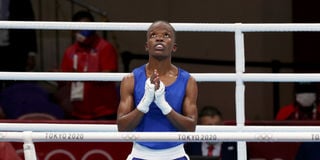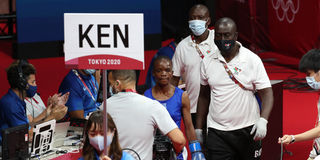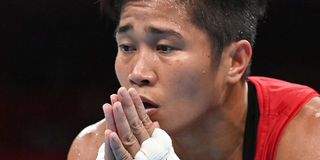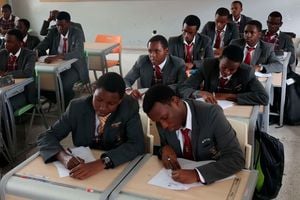For ‘Ghetto Girl’ Ongare, being an Olympian in itself defies belief

Kenya's Christine Ongare reactis during her women's fly (48-51kg) preliminaries boxing match during the Tokyo 2020 Olympic Games at the Kokugikan Arena in Tokyo on July 25, 2021.
What you need to know:
- Kenya is now down to two boxers after team captain Nick Okoth also lost to Mongolia’s Tsenedbaatar Erdenebat on Saturday.
- Elly Ajowi (heavyweight) and Elizabeth Akinyi (welterweight) were given byes into the second round where they fight Cuba’s Julio la Cruz and Alcinda Helena Panguana of Mozambique, respectively.
In Tokyo
Kenya’s Christine Ongare lost to Irish Magno of the Philippines in Monday’s flyweight bout, fair and square. No doubt about it.
The Philipino was dominant throughout the three rounds at the Kokugikan Arena, asking many questions of the Kenyan. Ongare provided little, or no answers.
And sagging headgear meant that the Kenyan lost concentration, and precious seconds adjusting it, playing to Magno’s advantage.
But for “Ghetto Girl,” brought up in the slums of Kariobangi North, merely making it to the Olympics is huge victory in itself.

Philippines' Irish Magno (red) and Kenya's Christine Ongare fight during their women's fly (48-51kg) preliminaries boxing match during the Tokyo 2020 Olympic Games at the Kokugikan Arena in Tokyp on July 25, 2021.
She walked into the blue corner for Monday morning’s fight to sounds of Third World’s reggae song “Now that we found love.”
One of the stanzas goes:
“Let’s give love a try
Let Jah control, control your destiny
We owe it to ourselves, yes we do
To live happy, eternally”
Very much Ongare’s philosophy.
Although she provided little resistance to the imposing opponent, “Ghetto Girl” seemed resigned to letting Jah take control.

Philippines' Irish Magno (red) and Kenya's Christine Ongare fight during their women's fly (48-51kg) preliminaries boxing match during the Tokyo 2020 Olympic Games at the Kokugikan Arena in Tokyp on July 25, 2021.
“The fight was good, despite the fact that’s I’ve had little exposure, besides the one tournament we fought in Russia,” she explained.
“I have achieved my dream, and I’ve learnt a lot and I thank God for everything.”
What about the headgear?

Kenya's Christine Ongare makers her way to the ring for her women's fly (48-51kg) preliminaries boxing match during the Tokyo 2020 Olympic Games at the Kokugikan Arena in Tokyp on July 25, 2021.
Just 1:45 into the first round, “Ghetto Girl” was already adjusting the oversize gear.
“My head is small, and they didn’t have a smaller size than the one I used, and so it was quite challenging.
“I can argue that this is what cost me the first round.
“She was a patient fighter because having known that my headgear had issues, she could have easily gone for the kill.”

Philippines' Irish Magno celebrates after winning against Kenya's Christine Ongare at the end of their women's fly (48-51kg) preliminaries boxing match during the Tokyo 2020 Olympic Games at the Kokugikan Arena in Tokyo on July 25, 2021.
With Sports Cabinet Secretary Amina Mohamed, National Olympic Committee of Kenya President Paul Tergat and his predecessor Kipchoge Keino, among other dignitaries, watching ringside, Ongare battled bravely to the end, at times taking the fight to the powerful Pilipino despite the Kenyan’s tiny frame.
“The experience was great because I’ve reached where I really wanted to be – at the Olympics,” she reflected, with coach Musa Benjamin by her side.
“Although I didn’t get what I wanted in terms of medals, I thank God for everything, because when they count the Olympians, I will be among them.”

Philippines' Irish Magno (red) and Kenya's Christine Ongare fight during their women's fly (48-51kg) preliminaries boxing match during the Tokyo 2020 Olympic Games at the Kokugikan Arena in Tokyo on July 25, 2021.
Ongare was a mother at 12, and, meanwhile, believes her son Maxwell shouldn’t be under any pressure to don boxing gloves like mum.
“Just like me, he has started out as a footballer. But in my family, there’s democracy and I won’t force him to get into boxing,” she explains.
She believes discipline is the only way forward for young girls who wish to take up the male-dominated sport of boxing.
“What’s important is perseverance, patience and discipline, and above all, putting God first.
“These are the four key pillars that build my career without which it would be very difficult.”
What did coach Musa think of the show by “Ghetto Girl”?
“Today, Christine met a technically and tactically superior boxer who was also a heavy hitter,” he conceded.
“She (Ongare) gave a good account of herself, considering all factors. Under the circumstances we are satisfied with what we saw.”
The coach rued the absence of high-profile, pre-Olympics tournaments that could have offered the much-needed exposure, adding that they had to shift weight categories for Ongare which also disadvantaged her.
“She’s actually a light-flyweight, not a flyweight, and so she already has that disadvantage of weight.
“But she is a huge inspiration and motivation to the young girls.”
Kenya is now down to two boxers after team captain Nick Okoth also lost to Mongolia’s Tsenedbaatar Erdenebat on Saturday.
Elly Ajowi (heavyweight) and Elizabeth Akinyi (welterweight) were given byes into the second round where they fight Cuba’s Julio la Cruz and Alcinda Helena Panguana of Mozambique, respectively.





